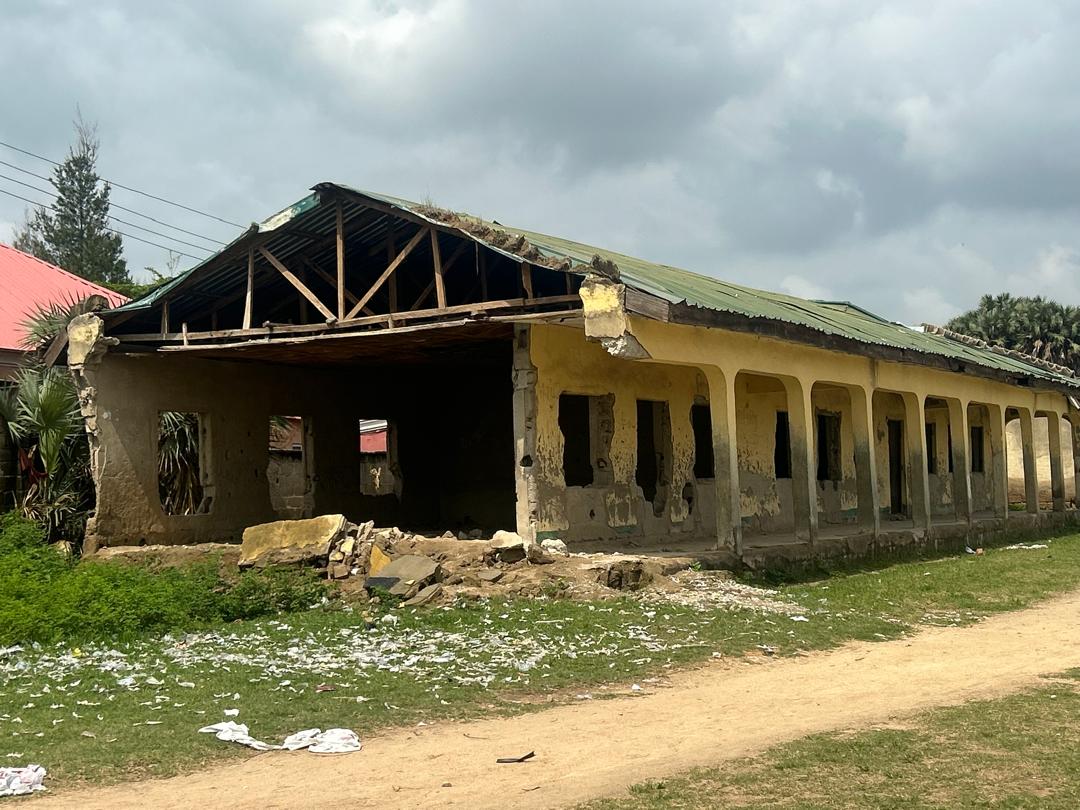
Tears, Cracks, and Empty Promises: Niger State School Left to Rot as Children Learn on Flooded Floors

In Niger State, the future of hundreds of children hangs precariously between collapsing ceilings and broken promises, as Tudun Fulani Primary and Secondary School in Bosso, Minna, battles conditions that many have described as a complete betrayal of the very idea of education. The once vibrant school has now become a place where survival, not learning, is the daily routine, forcing parents, teachers, and pupils to cry out for urgent government intervention that never seems to come.
The alarm was sounded by MonITNG, a civic technology platform that has taken it upon itself to amplify the voices of forgotten communities. In a strongly worded statement accompanied by heart-wrenching pictures, the group painted a picture of decay, neglect, and shame. The images tell a tragic story: classrooms with cracked walls that could collapse at any moment, ceiling boards hanging dangerously, roofs that leak with every rainfall, and children sitting on bare, dusty, or flooded floors with no desks or chairs. This is the reality of education in Tudun Fulani—a reality that makes a mockery of government claims that billions have been spent on education in the state.
“When it rains, the classrooms flood, children are forced to raise their books above water, and teachers struggle to maintain any semblance of learning,” MonITNG lamented. “This is not education, it is survival.”
The group did not mince words in its indictment of the state government, accusing it of deliberate neglect and hypocrisy. According to MonITNG, past administrations in Niger State borrowed heavily, boasting of investments in infrastructure, yet communities like Tudun Fulani never saw any of the benefits. Today, the current government claims that 70% of the state’s budget is allocated to education and health, but the deplorable state of this school tells a different story.
“How long will this neglect continue?” the group asked. “How can we speak of a brighter future when our children are sitting on cracked floors under leaking roofs? This is not just poor governance, it is injustice. It is the destruction of the dreams of innocent children who deserve dignity, safety, and hope.”
For the teachers and parents, the situation is not just heartbreaking but humiliating. Many of them have spoken out repeatedly, submitting petitions and making appeals, but their voices have been drowned out by the silence of government indifference. Parents describe the daily struggle of sending their children to school with hope, only to return home drenched from flooded classrooms, their books ruined, their morale broken. Teachers, too, are forced to work in impossible conditions, juggling between ensuring safety and attempting to impart knowledge in environments that would make any lesson meaningless.
The demand from MonITNG is simple but urgent: declare a State of Emergency on Education in Niger State. Their statement carried a sense of desperation that echoed the frustrations of the community. “Not tomorrow. Not next year. Now. Fix the leaking roofs. Provide desks and chairs. Rebuild the classrooms. Let children learn with dignity,” the group urged.
Beyond the crumbling structures and lack of basic amenities, the situation at Tudun Fulani reflects a much deeper crisis in Nigeria’s public education system. Across the country, millions of children in rural communities are trapped in schools that are more death traps than learning centers. While politicians make promises during election campaigns and announce lofty budgets, very little of that translates to actual development on the ground. The result is a widening gap between the privileged who can afford private schools and the poor who are left with nothing but dilapidated government facilities.
For Niger State, the neglect of Tudun Fulani is a mirror reflecting years of failure. Education, which should be the cornerstone of progress, has been treated as an afterthought, even while officials boast of reforms and investments. The sight of children learning on bare floors in 2025, when billions have allegedly been pumped into the sector, is nothing short of scandalous.
Community members have expressed outrage that children are expected to perform well academically when the very environment designed to nurture their growth is instead destroying their confidence and dreams. “You cannot expect a child who sits in a flooded classroom with no desk, no roof over his head, to compete with children elsewhere who have access to modern facilities,” one parent angrily stated. “This is how the cycle of poverty continues. Government has failed us.”
The reality of Tudun Fulani stands in stark contrast to the repeated claims by political leaders that education is a priority. Every election cycle, education tops manifestos, but the implementation is where promises evaporate. The MonITNG statement did not only highlight the physical decay of the school but also the moral decay in governance. It stressed that education is not a privilege to be enjoyed by a select few but a right guaranteed to every child. Anything less is injustice.
As the call for urgent action grows louder, the question remains whether the Niger State Government will listen or continue to turn a blind eye. If indeed 70% of the state’s budget is going to education and health, then where is the money? Who is accountable for the fact that children in Tudun Fulani are learning under life-threatening conditions? These are the questions that parents, teachers, and concerned citizens are demanding answers to.
The plight of Tudun Fulani Primary and Secondary School is not just a Niger State problem; it is a Nigerian problem. It is a reminder that despite billions allocated to education nationwide, corruption, mismanagement, and neglect ensure that little changes at the grassroots. It is a reminder that behind every dilapidated school building is a child whose dreams are being quietly suffocated by government failure.
For now, the pupils of Tudun Fulani will continue to learn on cracked floors and under leaking roofs, unless urgent steps are taken. But the situation has already ignited a wider conversation about priorities, accountability, and the future of education in Niger State and beyond. Whether or not the government acts, MonITNG’s message has pierced through: the children cannot wait any longer. The future of Niger State depends on the very children being neglected today.
In the end, the story of Tudun Fulani is more than a story of a collapsing school. It is the story of broken promises, squandered resources, and lost opportunities. It is a tragic reminder that while leaders make speeches about development, the most vulnerable—innocent children—are the ones paying the price. If the government of Niger State does not wake up to its responsibilities, it risks not only the collapse of a single school but the collapse of an entire generation’s hope for a better tomorrow.


